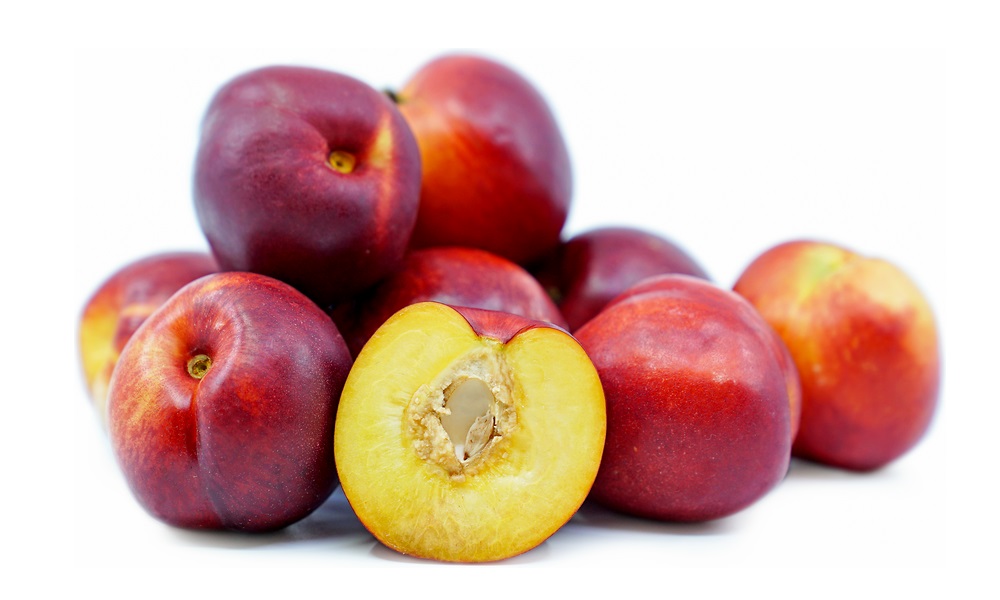Yes, nectarines are good for dogs! Dogs love the sweet taste of nectarines, and they are a great source of vitamins and minerals.
Nectarines are also low in calories and fat, making them a healthy treat for your dog.
You should be careful about pits of nectarines, which can cause gastrointestinal issues and blockages in dogs.

What Fruits Dog Cannot Eat?
There are several fruits that are known to be toxic or potentially harmful to dogs. It’s important to avoid feeding the following fruits to dogs:
Grapes and raisins: Grapes and raisins can cause severe kidney damage in dogs, leading to symptoms like vomiting, diarrhea, and lethargy. Even small amounts can be toxic.
Avocado: Avocado contains a substance called persin, which is toxic to dogs in large amounts. It can cause gastrointestinal upset, breathing difficulties, and fluid accumulation around the heart in severe cases.
Cherries: While the flesh of cherries is not toxic to dogs, the pits contain cyanide and can pose a choking hazard. Additionally, cherries can cause upset stomachs and diarrhea due to their high sugar content.
Citrus fruits: Citrus fruits like oranges, lemons, limes, and grapefruits contain citric acid, which can cause stomach upset and may even lead to central nervous system depression if consumed in large quantities.
Pits and seeds: It’s important to remove pits, seeds, and cores from fruits before giving them to your dog. These can pose a choking hazard and may contain toxic substances.
Persimmons: Persimmons contain seeds that can cause intestinal blockages in dogs. They can also lead to gastrointestinal upset, including vomiting and diarrhea.
Can Dogs Eat Nectarine Or Peach?
The answer is yes! Both of these fruits are safe for dogs to eat in moderation. Nectarines and peaches are both great sources of vitamins A and C, as well as fiber. They can make a healthy and tasty treat for your dog. Just be sure to remove the pit from the fruit before giving it to your pup, as it can be a choking hazard.
What Fruit is Healthiest for Dogs?
When it comes to feeding fruits to dogs, it’s important to remember that not all fruits are safe for them to consume. However, there are some fruits that are generally considered safe and healthy for dogs in moderate amounts. Here are a few examples:
Apples: Apples are a good source of vitamins A and C, as well as fiber. However, it’s important to remove the seeds and core, as they can be a choking hazard and contain traces of cyanide.
Bananas: Bananas are a good source of potassium, fiber, and vitamin C. They can be given to dogs in moderation, as they are high in sugar.
Watermelon: Watermelon is a hydrating fruit that contains vitamins A, B6, and C, as well as potassium. Remove the seeds and rind before giving it to your dog, as they can cause digestive issues.
Blueberries: Blueberries are rich in antioxidants and can be a healthy treat for dogs. They are low in calories and high in vitamins C and K.
Strawberries: Strawberries are packed with vitamins and antioxidants. They can be a healthy and tasty treat for dogs, but remember to remove the green tops.
Always introduce new fruits gradually and in small quantities, and observe your dog for any signs of adverse reactions.
Can Dogs Eat Plums And Nectarines?
Yes, dogs can eat plums and nectarines. Just like with any other fruit, however, you should remove the pit and seeds before feeding them to your dog. The pits and seeds of these fruits contain cyanide, which is poisonous to dogs (and humans).
If you do feed your dog plums or nectarines, make sure to do so in moderation as too much sugar can lead to weight gain and other health problems.
Are Nectarines Good for You?
If you’re looking for delicious and nutritious fruit, nectarines are a great option! These stone fruits are an excellent source of vitamins A and C, as well as fiber. Nectarines also contain antioxidants and phytochemicals that can boost your health.
Here are some of the top reasons to add nectarines to your diet:
1. Nectarines Can Help Boost Your Immunity Thanks to their high vitamin C content, nectarines can help keep your immune system strong. Vitamin C is a powerful antioxidant that helps fight off harmful toxins and bacteria. This can help protect you from getting sick and may even help shorten the duration of a cold or flu if you do get sick.
2. Nectarines May Help Lower Your Risk of Cancer Studies have shown that foods rich in antioxidants like vitamin C may help lower your risk of developing cancer. The antioxidants in nectarines can help scavenge harmful free radicals that can damage cells and lead to cancer development.
Adding nectarines to your diet may not be a cure-all, but it’s certainly a good way to up your intake of disease-fighting nutrients!
Can Dogs Eat Nectarines Without the Pit?
The short answer is yes! Nectarines are perfectly safe for dogs to eat. In fact, they make an excellent treat or snack for your pooch.
Just be sure to remove the stem and leaves before giving your dog a nectarine, as these parts can be harmful if ingested. And always supervise your dog when he’s eating any type of fruit or vegetable, just to be on the safe side.
Conclusion
Yes, nectarines are good for dogs! They’re a great source of fiber and vitamins A and C, and they can help keep your dog’s digestive system healthy. Just be sure to remove the pit before giving them to your pup, as it can be a choking hazard.